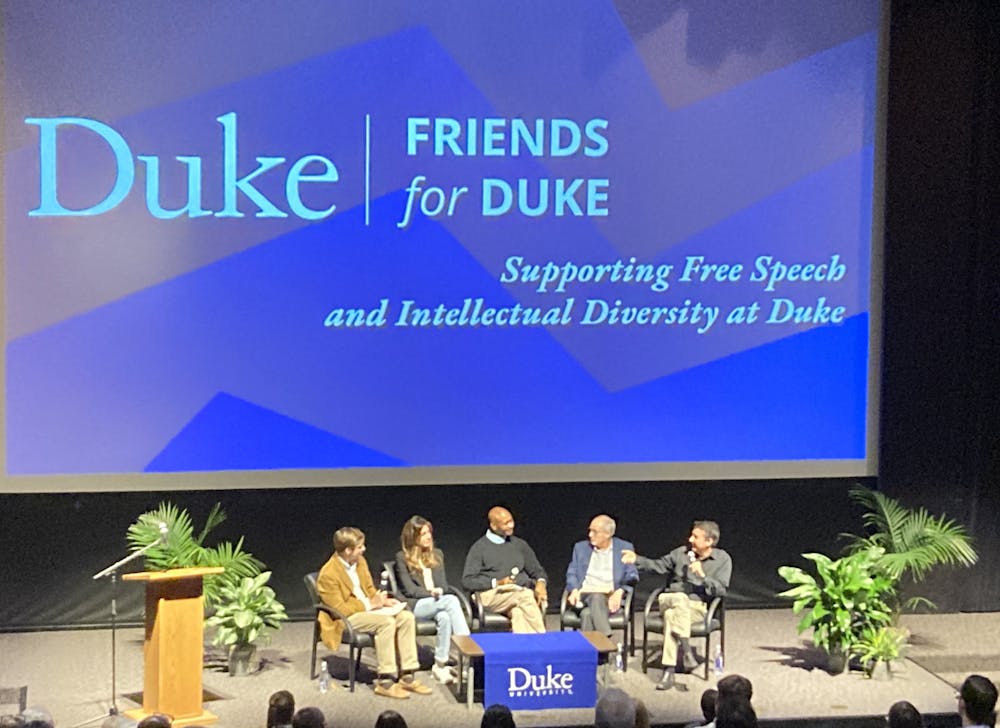How should Duke and other elite universities respond to the Supreme Court’s recent overturning of race-based affirmative action?
A Saturday panel hosted by Friends for Free Speech and Intellectual Diversity at Duke attempted to tackle this question, moderated by John Rose, associate professor of the Civil Discourse Project and an instructor at the Kenan Institute for Ethics.
Panelists included Peter Arcidiacono, William Henry Glasson distinguished professor of economics and lead expert witness for Students for Fair Admissions, Stephen Buckley, Patterson professor of the practice of journalism and public policy, Timur Kuran, professor of economics and political science and Gorter Family professor of Islamic studies, and senior Sara Be.
Peter Kahn, Trinity ‘76, introduced the panel and mentioned that Dean of Undergraduate Admissions Christoph Guttentag was invited to the talk but declined, “noting that it is premature for him to talk about these issues in a public setting.”
Legacy admissions and the ‘athlete bump’
The history of athletic and legacy priority admissions was viewed through the lens of the Harvard Supreme Court case.
Arcidiacono pointed out the “surprisingly huge role” that being an athlete plays in Harvard University’s admissions process. He added that Harvard offers more varsity sports than any school in the country, despite its relatively small size.
“Athletics is something that levels the playing field, anybody can sort of participate in such,” Arcidiacono said. “That might be true in some sports, but it’s not true at Harvard.”
The disparity can be attributed to Harvard having many sports like sailing that “very much favors the rich,” according to Arcidiacono.
Buckley, however, cautioned against potentially overcorrecting for the advantages given to athletes, noting that a lot of students “would not have had an opportunity for a college education had it not been through athletics.”
The panel then moved to discuss legacy admissions, in light of President Vincent Price recently stating that no official “weight” was given to legacy applicants, with their files instead given an “extra read.”
“On the one hand, we teach that a university should be a place where you go, and you explore, you learn how to learn,” Buckley said. “On the other hand, we also want our students to go off and write six-figure checks for us to sustain the university, and I think that’s a fundamental conflict.”
Arcidiacono said that, despite the benefits of legacy admissions, it ultimately “hurts trust in higher education,” mentioning that polls show this trust plummeting in recent years.
Standardized testing as a factor
Kuran referred to standardized testing as the “least imperfect” way of measuring academic achievement. He argued that wealthy students, who have access to college counselors and other resources in the college admissions process, will have a better chance of “gaming” the college admissions process.
“Test scores invariably favor the rich, but the other things favor the rich even more,” Arcidiacono said. “My eldest son, he worked for a computer science professor here at Duke for free one summer — he could work for free because of our financial situation.”
Buckley said that he was a “tad skeptical” about standardized tests, pointing out that, historically, tests were not truly objective. He also spoke about his wife’s experience as an SAT tutor.
“She taught strategies for how to take the test … it wasn’t about teaching students how to accumulate knowledge that they then passed onto the test, it was ‘here’s how to guess well, here’s how to use your time wisely,’” Buckley said.
Building off Buckley’s points, Arcidiacono argued that more research should be done to see if standardized tests are “good predictors or not” and if adjustments to the tests need to be made, but universities hide the data needed to do such research.
The panel also touched on the “gamification” of college applications, the pressure for applicants to promote certain aspects of themselves and downplay others. Be, the only student on the panel, spoke about her personal experiences with the application process.
“When I was writing my personal statement, there were some things I knew I was going to emphasize,” she said. “I was going to emphasize that both of my parents were immigrants. I was going to emphasize more so that my mom was Hispanic rather than that my dad was Chinese.”
Kuran added that standardized testing is not a perfect metric of academic aptitude, but was the one “least conducive to gamification” due to the existence of resources like college counselors that are only accessible to wealthier applicants.
Other forms of diversity
Rose presented intellectual diversity as a potential factor that could weigh into college admissions decisions, asking if giving preference to students who brought in new ideas and perspectives would bring in a more ideologically diverse population.
“It’s a form of diversity that some say matters a lot in the classroom,” he said.
Kuran, Be and Buckley agreed that there was a need for diversity of opinions in the classroom setting for the purpose of productive learning. Be and Buckley noted this diversity may already exist, students just have to feel comfortable and invited to voice these opinions.
“Good students want to please, they want to do what the professor asks of them. And so when professors say, hey, disagree with each other, respectfully, and be intellectually honest … they leap in, and they are ready to engage,” Buckley said.
Arcidiacono noted that there will most likely be a shift towards focusing on economic diversity in new student admissions, echoing what the University of North Carolina at Chapel Hill has done with their newly implemented policy that provides full tuition coverage for in-state families making less than $80,000. Duke also implemented a similar policy in June, providing full tuition for students from North Carolina and South Carolina with family incomes below $150,000.
“My real dream is that this will lead to different responses by different universities so that we can actually find out what works,” Arcidiacono said. He hopes that universities can then analyze the resulting data to determine which admissions strategies are most effective in creating a diverse student body.
“If you want a little bit of affirmative action, you should ban affirmative action because fundamentally, universities are going to figure out ways of doing so,” Arcidiacono joked.
Get The Chronicle straight to your inbox
Signup for our weekly newsletter. Cancel at any time.

Jothi Gupta is a Trinity junior and an enterprise editor of The Chronicle's 120th volume.

